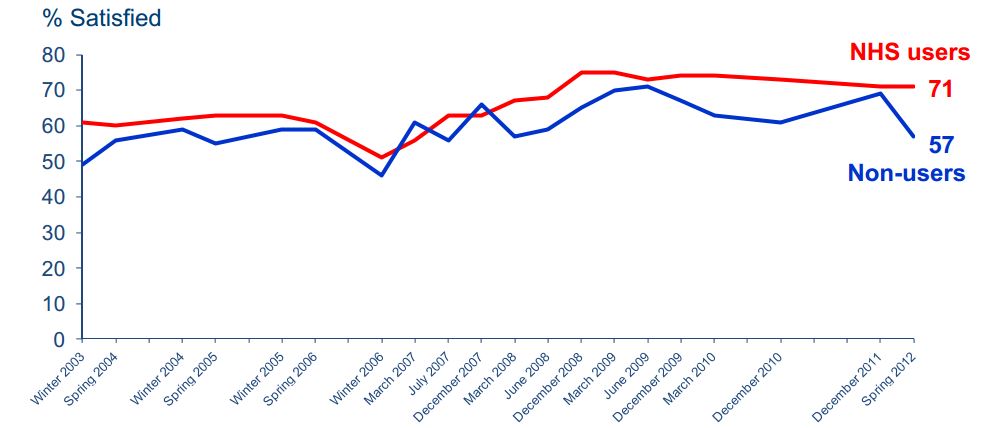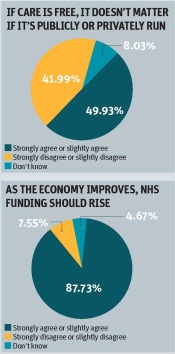The Health Service Journal organised a poll of 2000 voters across England in June.
They found that 70% of those questioned agreed that the principle of healthcare free at the time of delivery was under threat. Of course no politician has actually proposed such a thing, but the idea is repeatedly raised by people within the NHS. And a large majority agreed with the statement that “The NHS is under threat from private healthcare companies”. But half of them agreed that “If care is free it doesn’t matter if it’s publicly or privately run”, so it’s not very clear exactly how they though the NHS was threatened. But 97% believed the NHS was worth fighting for, and 92% that it was integral to maintaining social equality.
It was closure of Accident and Emergency departments which most worried people 75%, while only 50% were worried about the possibility of introducing some charges and around 55% worrying about restrictions on medication or treatment. The idea of moving services out of hospitals into the community was popular. 79% of young people were enthusiastic using smartphones to monitor their health. Older people, unsurprisingly, were less enthusiastic. Younger people, though showing lower levels of support for the basic principles of the NHS, said they were more likely to change their vote based on NHS policy. This might be because they were generally more likely to change their vote than older people.
90% agreed that NHS funding should rise as the economy improves. As usual most people felt the Labour Party understood the NHS and most thought the Conservative Party threatened it, but this advantage was much less when asked about running the service efficiently. HSJ plans to repeat its survey quarterly until the General Election.
Two weeks ago Ipsos MORI did a survey for the British Medical Association of 1970 people across Great Britain. The BMA were no doubt pleased to find 66% are in favour of doctors having a greater say in how the NHS is run, and that 73% believe policies about the NHS from political parties are designed to win votes, not to do what is best for the NHS. They might have been disappointed to find that only 21% wanted to see less involvement by NHS managers in running the NHS. However 64% agreed that “The NHS should manage itself, without the involvement of politicians, as it understands how best to provide healthcare.”
56% were satisfied with the running of the NHS.
Ipsos MORI Social Research Institute did a Tracker Survey of Public Perceptions of the NHS for the Department of Health between Spring 2000 and Spring 2012. They seem to have abandoned it now, perhaps because they found a fall in agreement that “the government has the right policies for the NHS since December 2009 (from 28% to 22%) continuing a steady decline since 37% was recorded in December 2009. 45% then disagreed that the government had the right policies.
There was a marked North/South gradient in responses to the question “Overall, how satisfied or dissatisfied are you with the running of the National Health Service nowadays?” 72% were satisfied in the North East, but only 61% in the South East. There were similar gradients in social class. 72% of those in social classes D and E were satisfied compared to 64% of those in social classes A and B. But the most significant feature was the marked reduction in satisfaction among those who were not actually users of the service – presumably because of the bad publicity generated by the campaign against the Health and Social Care Act.
 59% thought the reforms would make services worse for patients. 70% blaming both closures and privatisation.
59% thought the reforms would make services worse for patients. 70% blaming both closures and privatisation.

